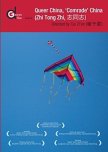This review may contain spoilers
An important and comprehensive historical record of the queer movement in modern China
Directed in 2009 by Cui Zi En, China's most prolific celebrated gay filmmaker, 'Queer China, "Comrade" China' documents the history of the queer community in the People's Republic of China from the 1984s to the 2000s.
Premiered on the opening night of the 2009 Shanghai Queer Film Festival (Festival that carried that name until 2012, but as of 2016 began to be called ShanghaiPRIDE Film Festival), the first LGBT pride festival instituted in China and second in importance in the Asian nation After the Beijing Love Queer Cinema Week (previously Beijing Queer Film Festival, since 2001), the documentary 'Queer China, Comrade China' was recognized as the most authoritative account of the story queer culture in China to date.
Presented at the Vancouver International Film Festival and Busan International Film Festival in 2009, the film uses a chapter structure (like a history book) to document advances in rights, literature and the arts, community and LGBT+ activism in this long period of that nation's history.
Through many exclusive interviews with more than three dozen prominent queer activists, academics and filmmakers, including Cui Zi En himself, Shi Tou, Li Yinhe and Zhang Yuan, as well as the use of historical archival material, the documentary becomes a record important and comprehensive history of the queer movement in modern China.
China's leading queer theorist, activist and academic includes rarely seen footage of the first appearance of gays and lesbians on Chinese state television in the documentary, including several featuring the documentary film's director himself.
'Queer China, "Comrade" China' documents the changes and developments in lesbian/gay/bisexual/transgender culture that have taken place in China over the past 80 years up to the time of its release.
Like never before, this film explores the historical milestones and ongoing advocacy efforts of the Chinese LGBT community.
The film examines how changing attitudes in the law, media and education have transformed queer culture from an unspeakable taboo to an accepted social identity.
The film culminates with the submission of Dr. Li Yinhe's same-sex marriage bill to the Legislative Affairs Commission of the National People's Congress of China, the highest legislative body of the People's Republic of China in 2003, a milestone important in the fight for the acceptance of queer identity in China.
Premiered on the opening night of the 2009 Shanghai Queer Film Festival (Festival that carried that name until 2012, but as of 2016 began to be called ShanghaiPRIDE Film Festival), the first LGBT pride festival instituted in China and second in importance in the Asian nation After the Beijing Love Queer Cinema Week (previously Beijing Queer Film Festival, since 2001), the documentary 'Queer China, Comrade China' was recognized as the most authoritative account of the story queer culture in China to date.
Presented at the Vancouver International Film Festival and Busan International Film Festival in 2009, the film uses a chapter structure (like a history book) to document advances in rights, literature and the arts, community and LGBT+ activism in this long period of that nation's history.
Through many exclusive interviews with more than three dozen prominent queer activists, academics and filmmakers, including Cui Zi En himself, Shi Tou, Li Yinhe and Zhang Yuan, as well as the use of historical archival material, the documentary becomes a record important and comprehensive history of the queer movement in modern China.
China's leading queer theorist, activist and academic includes rarely seen footage of the first appearance of gays and lesbians on Chinese state television in the documentary, including several featuring the documentary film's director himself.
'Queer China, "Comrade" China' documents the changes and developments in lesbian/gay/bisexual/transgender culture that have taken place in China over the past 80 years up to the time of its release.
Like never before, this film explores the historical milestones and ongoing advocacy efforts of the Chinese LGBT community.
The film examines how changing attitudes in the law, media and education have transformed queer culture from an unspeakable taboo to an accepted social identity.
The film culminates with the submission of Dr. Li Yinhe's same-sex marriage bill to the Legislative Affairs Commission of the National People's Congress of China, the highest legislative body of the People's Republic of China in 2003, a milestone important in the fight for the acceptance of queer identity in China.
Was this review helpful to you?


 1
1 2
2





















